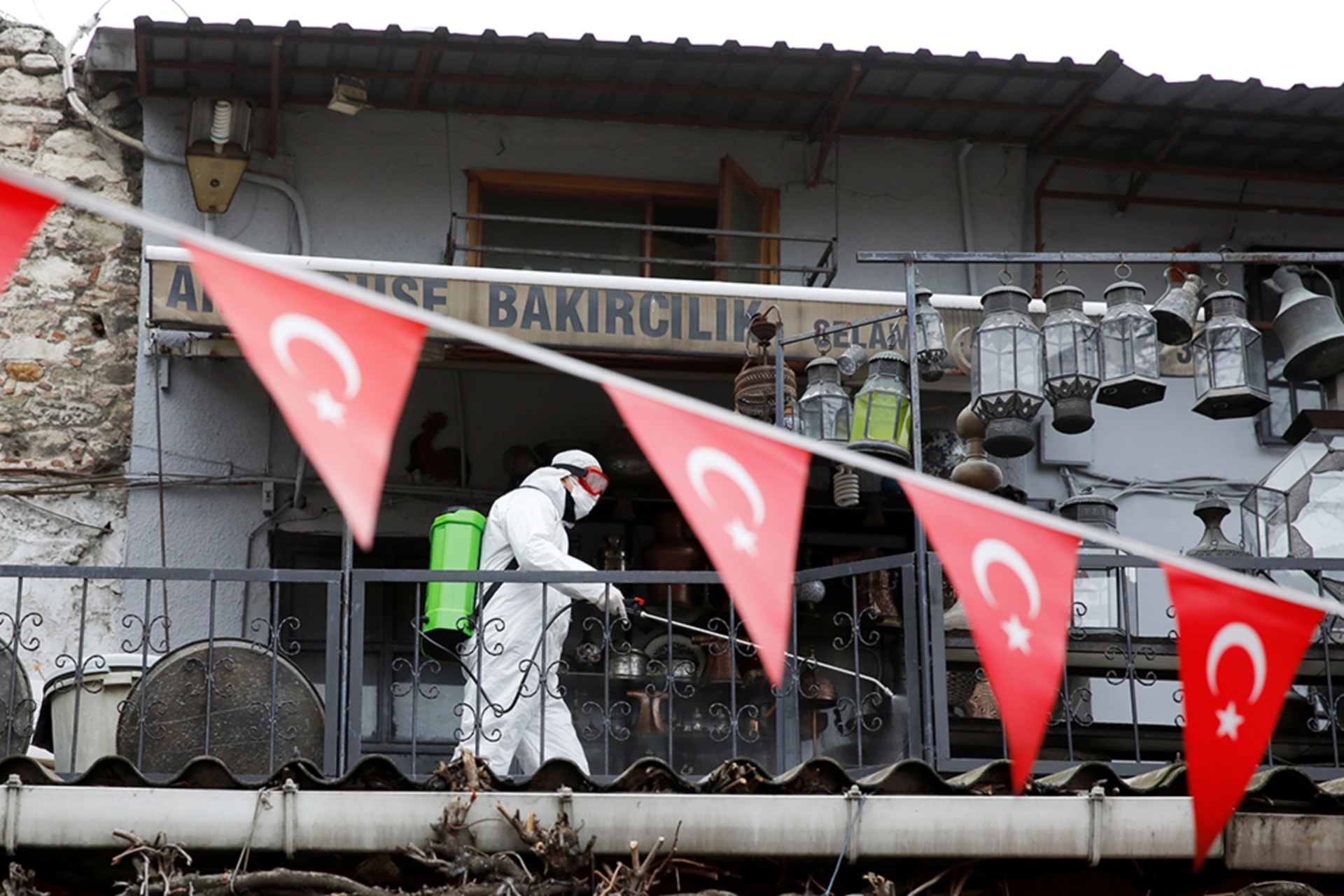Sisi and Erdogan Are Accomplices of the Coronavirus
By killing the Middle East’s sense of community, the region’s dictators have helped the pandemic on its death march.
Originally published at Foreign Policy

By experts and staff
- Published
Experts
![]() By Steven A. CookEni Enrico Mattei Senior Fellow for Middle East and Africa Studies
By Steven A. CookEni Enrico Mattei Senior Fellow for Middle East and Africa Studies
The Centers for Disease Control and Prevention’s manual for global and national health emergencies makes one thing clear: A critical component of fighting a pandemic such as COVID-19 is clear, consistent, science-based information that is communicated through a trusted and respected source. When people are worried about their health, they want information from the person in a white lab coat.
Given the gravity of current circumstances there is no risk of sounding melodramatic, so I would add a second requirement for effectively combating the coronavirus—humanity. You know basic humanity when you see it: It’s the sense of community and social trust engendered by natural empathy.
There is a short supply around the world of both competent expertise and genuine sense of the common good. The United States is certainly not exempt from the shortage. But the problem is acute across the Middle East, North Africa, and Turkey. The entire region is experiencing a wave of coronavirus cases, but the official numbers from government health ministries do not offer a clear picture of the problem, either because they do not know or because they are lying about the extent of infections. Among the hardest-hit countries is Qatar, with one of the world’s worst outbreaks per capita. At least the Qataris have money to throw at the problem. Not so Egypt or Algeria or Tunisia. There is precious little data on testing, but one can safely assume that whatever has been done pales in comparison to what is necessary.
Much of this stems from incompetence, complacency, and lack of basic decency among the region’s leaders, which has led to a deadly breakdown of social trust. I am not suggesting that Iraqis, Egyptians, Palestinians, Turks, Saudis, and others lack the capacity to empathize with their fellow citizens. Rather, the disdain their leaders have for the societies they oversee has robbed them of social cohesion, necessarily rendering it harder to survive and recover at a time of crisis. This is a recipe for the kind of disaster in the Middle East that boggles the mind.
Before moving on, let me stipulate for any critics in the Middle East my belief that U.S. President Donald Trump’s administration’s response to the coronavirus pandemic has been nothing less than appalling and profoundly irresponsible. Both Trump and Vice President Mike Pence have proved themselves to be the least credible voices on the crisis, both failing to reassure anyone that the U.S. government under their leadership could manage the situation and, in the process, putting people in harm’s way. History will render judgment on their contribution to the collapse of trust in the United States’ institutions of government, the press, and science, and its impact on the many Americans who might have remained healthy but were instead infected and died.
That stipulated, let’s turn back to the Middle East. Who among the current crop of leaders of major Middle Eastern countries can people turn to for clear, dispassionate, fact-based information? Egyptian President Abdel Fattah al-Sisi? Turkish President Recep Tayyip Erdogan? Saudi Crown Prince Mohammed bin Salman? These are strongmen who command significant amounts of resources, but they are hardly the strong leaders that people need now. There is no evidence that they are more prepared to offer their citizens any more than the obfuscation and misdirection that the White House has for Americans, though with likely direr consequences. Perhaps Middle Eastern leaders will rise to the occasion. One can only hope, but the track record suggests disaster compounded by arrogance, incompetence, and brutality.
Egypt is the most worrisome in the coronavirus crisis. The country is huge, its population having recently surpassed 100 million, with nearly one-quarter of those people in greater Cairo. How do Egyptians practice social distancing in such a megalopolis, especially in its poorer districts? Egypt’s public health infrastructure is fragile at best, and the private sector is not well-positioned to fill in the gaps by issuing guidelines or helping to organize testing, as it has done in the United States. On top of these challenges is the very fact that the Egyptian leadership’s first inclination is to lie. They are most certainly lying about the rate of coronavirus infection—as of Monday, Sisi’s government would have people believe that Egypt has 166 cases of COVID-19 and four deaths. Modelers at the University of Toronto indicate that it could be closer to 20,000, and Sisi and his advisers no doubt understand that figure to be far more plausible.
The Egyptian leadership has nevertheless stuck with the message of an ostensibly small number of infections, downplaying the extent of the crisis for fear of harming the tourism industry. After years of decline following the uprising that overthrew then President Hosni Mubarak, the 2015 bombing of a Russian airliner over the Sinai Peninsula, and the disappearance of an EgyptAir flight over the Mediterranean in 2016, last year was a banner year for visitors to Egypt. The authorities in Cairo want to maintain the momentum and keep the dollars flowing, so—just like the U.S. president—they have been emphasizing that COVID-19 is just like a cold that most people get over relatively quickly. Of course, this conveniently overlooks the fact that the crew and foreign passengers on a now-infamous Nile riverboat, the MS A’Sara, have all been quarantined and that infections in a number of countries, including the United States, Canada, Greece, and France, can be traced back to tourist travel in Egypt.
Even the Egyptians could not willfully ignore reality forever, so they instituted some half-measures, including permitting the suspension of Friday prayer at mosques, curtailing organized tours in Luxor, cutting back on cultural events, and closing universities. In an implicit recognition that the country is sitting on top of a COVID-19 bomb, Sisi has directed $6 billion—a significant sum for Egypt—to respond to the outbreak. They are so far behind, however, that even if the authorities ramp up testing, any hope of containment is long gone. When the wave of infections hits Egypt, as it inevitably will, Sisi is unlikely to be the kind of figure that can calm an anxious nation and stem the resulting instability that will threaten the region and Europe. He is no longer the savior of July 3, 2013, who rescued the country from the abyss, who elicits the loyalty of the citizenry. Instead, he is already widely seen by many of his own people as brutal, unwise, and dishonest.
Although Egypt is most worrisome, Turkey is only better off because it has a functioning health care system and good public health infrastructure. This is a credit to the ruling Justice and Development Party. But Erdogan’s government has been lying to the Turks and has only recently taken half-measures to prevent the spread of the disease. Why, one might ask, given the situation in the EU, did the government go forward with mass gatherings such as Friday prayers last week? The message from imams was reportedly focused on the importance of “social distancing,” but the damage was done. Turkey’s infection rate will undoubtedly spike; nevertheless, in the absence of widespread testing, Turkish business leaders are still encouraging people to visit malls and shop. Through the early phases of the pandemic, Erdogan, who has otherwise involved himself in every facet of public life both large and small, remained silent. This is a man more worried about taking the blame for the illnesses and deaths to come than the health and safety of his people. When the need for drastic public health measures becomes impossible to ignore, there is no telling how the public will react.
If the scene in Cairo a few weeks ago, in which hundreds tried to storm the Central Public Health Laboratories to obtain a coronavirus test, is any indication of what might come, countries in the region are in serious trouble. Marked by political and social systems that are rigged so that all the benefits flow to the wealthy and connected—not unlike the United States, but more pronounced and brutal—testing, health care, and basic needs will be distributed unevenly, and will further erode trust and radicalize societies in a variety of ways. Does anyone believe that Saudi elites will wait in line for coronavirus tests? No. The wealthy will hoard what they can before fleeing, leaving the rest to fend for themselves and face the tear gas and water cannons of the riot police. What about the armies of Bangladeshi, Indian, Pakistani, and Filipino guest workers throughout the Persian Gulf? They will be a black hole of coronavirus infections. They have little, if any, protections in the societies that cannot run without them, but they have power in numbers. The many dimensions of this virus and how it can upend already fragile societies are truly frightening.
Sisi and Erdogan are not unique, just illustrative of the added layer of complications that people in the Middle East face as they confront the coronavirus pandemic. The utter disdain the leaders harbor for their people and the related brutality with which many Middle Easterners have been treated has undermined—individually and collectively—the basic humanity, in the form of basic community, necessary for people to cope and survive. What kind of governments beat people who are desperate for a test that will be the difference between the ability to feed their families and not? What kind of system destroys much of its scientific community on the basis of guilt by association, conspiracy theories, and the political needs of a dear leader? Who would dare speak out publicly and offer another way in a place where a capricious ruler has deemed only his ideas about society are good? There are no societal backstops in these places, leaving people on their own to grapple with fear, stress, resignation, illness, and possible death.
If we have learned anything from this global health crisis, it is that there are no borders, no nationalisms, no differences to the way coronavirus ravages the human respiratory system. There are only differences in the quality of leadership, and the resulting senses of humanity in the nations they oversee. The Middle East—like the United States—is failing on both fronts.
